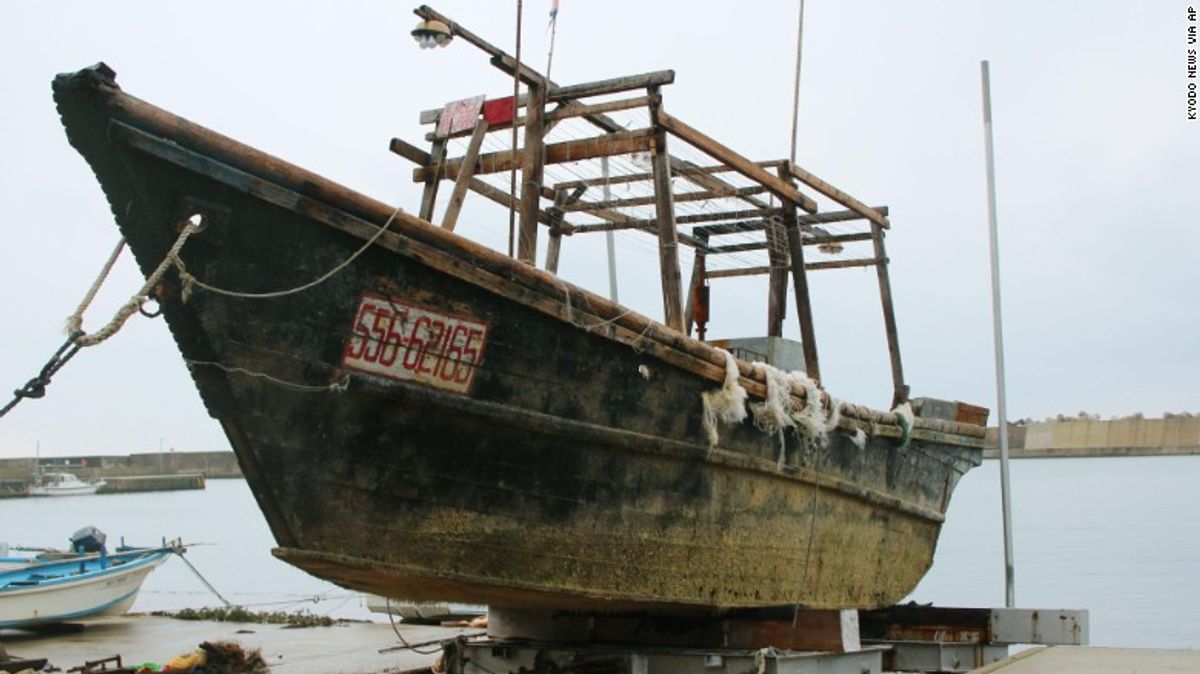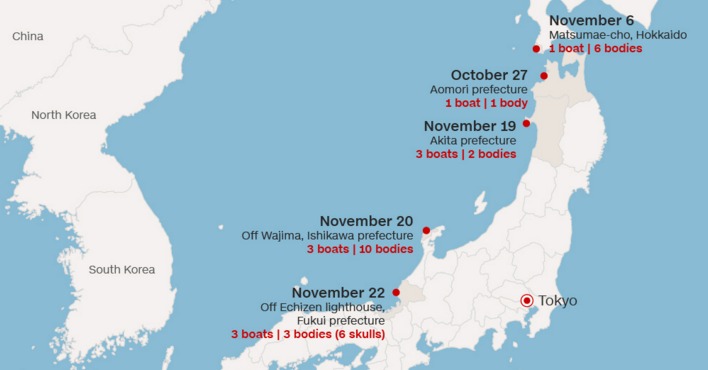[green-label]NEWS:[/green-label] On 1 December 2015 Reuters published a since-deleted article titled "North Korean ghost boats, in deadly hunt for fish, wash up in Japan," reporting:
Fishing boats carrying decomposed corpses have washed ashore in Japan in recent weeks, leading to speculation they are rickety North Korean vessels that have strayed dangerously far from port under the impoverished nation's push to boost its catch.There has been no mention from secretive North Korea of any missing boats, but its leader, Kim Jong Un, has put a high priority on fishing as a way of earning foreign currency and providing a sustainable food source that is not reliant on harvests and weather.
The Japanese coast guard and police reported 12 incidents of wrecked wooden boats, including some that were in pieces, on the country's shores and waters since October, containing 22 dead bodies, including five skulls.
The article (cached here) was cited by the Washington Post in a 2 December 2015 piece titled "Mysterious ‘ghost ships’ keep washing up in Japan with bodies on board," and a CNN item published on the same day and titled "Mysterious Korean 'ghost ships' found in Japan: What we know." The latter held that the phenomenon was not new, and that vessels of that description were reported somewhat frequently to the Japanese Coast Guard over the past five years:
This isn't the first time boats carrying bodies have been found off Japan, but it's the first time they've generated so much interest.The Japanese Coast Guard says that it's been happening for years, though it only has data for the last five. In 2011, 57 were found. In 2012, it was 47, and in 2013, 80 washed up or were found floating at sea.
In 2014, 65 were found and the count so far this year is 34. That's a total of 283 boats in five years -- however the Coast Guard hasn't disclosed how many bodies were on board.
What's unusual about the current batch of boats is that so many have been found in such a short period of time -- 12 within five weeks.
Indeed, the base claim wasn't novel in December 2015. A 2012 tweet featured a link to a strikingly similar CNN story:
A ghost ship: “@CNN: Decomposing bodies found inside drifting boat near Japan: https://t.co/5ONePRsQ”
— JD Taylor (@Jeff_D_Taylor) November 29, 2012
The appended article reported a similar discovery off the island of Sado in 2012:
A small wooden boat found off the western island of Sado in Japan contained decomposing bodies, according to local police.The boat was badly damaged and contained faint markings on the side that appeared to be Korean characters, according to the Sado West Police. But the characters were so faint that they could not read it clearly, said Toshiyuki Kojima, deputy chief of Sado Nishi Police Station.
A 27 November 2015 International Business Times article (titled "Japan investigates mystery of 'North Korean' ghost boats with 25 bodies on board") mentioned the 2012 incident reported by CNN:
Japanese authorities were investigating a serious of mysterious boats including some carrying decaying bodies that were found drifting at sea in recent weeks. A total 11 wooden vessels, some rickety and in poor conditions, have been washed ashore or retrieved by the coastguard off the country's western coast over the past two months.Another theory was that the passengers were North Korean defectors that similarly became stranded at sea while attempting to flee the regime for South Korea or Japan. In a similar incident five decomposing bodies were found aboard a stray vessel by Japanese authorities in 2012.
On the same date, Britain's Daily Mail published an article titled "Mystery ghost fleet washes up in Japan: Eleven ships containing 20 dead sailors are discovered off the coast... and nobody can explain why," suggesting that the phenomenon defied explanation. CNN included a map plotting late 2015 "ghost ship" discoveries in Japan:
Popular Mechanics cited a Chinese news source, surmising that the boats carried people attempting to flee North Korea:
According to the South China Morning Post, Japanese officials are currently operating under the assumption that these boats are just fishing vessels that ventured out too far and either suffered a malfunction or where swept up by unexpected winds or currents. The alternative, of course, is that passengers on these ships were attempting to defect.
On 2 December 2015, Reuters published a separate article titled "REFILE-North Korean ghost boats, in deadly hunt for fish, wash up in Japan," but all links to the previous story remained defunct. The subsequent article noted "(Corrects spelling of Pukyong National University in 8th paragraph)", but the content didn't appear to be meaningfully different.
In a broader context, the story was less cryptic than it appeared. Fishing is widely agreed upon as one of the most dangerous occupations worldwide. The deaths of approximately 22 fishermen (ostensibly Korean) sounded notable in a vacuum, but long-term statistics from the Food and Agriculture Organization of the United Nations (FAO) indicated such fatalities were not unusual:
Comparing fatality statistics in the fishing industry with those for other occupational categories reveals that fishing is one of the most dangerous occupations. In Australia, between 1982 and 1984, the fatality rate for fishermen was 18 times higher than the national average (143/100,000 person-years compared with 8.1/100,000); in Denmark, from 1989 to 1996, the rate was 25-30 times higher than the rate for those employed on land; in the United States in 1996, the death rate in fisheries was estimated at eight times that of persons operating motor vehicles for a living, 16 times higher than occupations such as fire-fighting and police work and over 40 times the national average. Other estimated comparative rates for 1997 include (x indicating the national average occupational fatality rate): Republic of Korea (15x); Estonia (11x); Italy (21x); Lithuania (11x); Poland (9x); Spain (6x); and Canada (3.5x).
While various articles about "ghost ships" in Japan piqued the attention of social media users, the scope and cause of the phenomenon appeared somewhat misconstrued. There appeared to be some credible evidence indicating several vessels carrying corpses washed ashore in parts of Japan in late 2015, but the Japanese Coast Guard stated that the discoveries were neither new nor without precedent; a similar incident in 2012 made international news.
Moreover, the "ghost ships" weren't entirely mysterious and it was inaccurate to say nobody could "explain why." The ships were believed to likely be North Korean, but whether the deceased passengers were unfortunate fishermen or deliberate defectors remained a matter of debate.
[article-meta]

